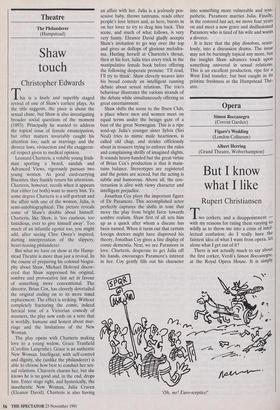Theatre
The Philanderer (Hampstead)
Shaw touch
Christopher Edwards
This is a lively and superbly staged revival of one of Shaw's earliest plays. As the title suggests, the piece is about the sexual chase, but Shaw is also investigating broader social questions of the moment (1893). Principally he wanted to address the topical issue of female emancipation, but other matters invariably caught • his attention too, such as marriage and the divorce laws, vivisection and the exaggerat- ed respect given to medical opinion.
Leonard Charteris, a voluble young Irish- man sporting a beard, sandals and Advanced Views, vigorously pursues two young women. As good card-carrying Ibsenites, they frankly return his attentions. Charteris, however, recoils when it appears that either (or both) want to marry him. To some degree Charteris is a self-portrait and the affair with one of the women, Julia, is semi-autobiographical. The picture reveals some of Shaw's doubts about himself. Charteris, like Shaw, is 'too cautious, too fastidious, ever to give himself away'. Too much of an infantile egotist too, you might add, after seeing Clive Owen's inspired, darting interpretation of the slippery, heart-teasing philanderer.
But what we have on show at the Hamp- stead Theatre is more than just a revival. In the course of preparing his colossal biogra- phy about Shaw, Michael Holroyd discov- ered that Shaw suppressed his original, sombre and provocative last act in favour of something more conventional. The director, Brian Cox, has cleverly dovetailed the original ending on to its more timid replacement. The effect is striking. Without completely fracturing the comic, indeed farcical tone of a Victorian comedy of manners, the play now ends on a note that is worldly, humane and honest about mar- riage and the limitations of the New Woman.
The play opens with Charteris making love to a young widow, Grace Tranfield (Caroline Langrishe). Grace is an authentic New Woman. Intelligent, with self-control and dignity, she (unlike the philanderer) is able to choose how best to conduct her sex- ual relations. Chat tens charms her, but she knows he is no good and, in the end, drops him. Enter stage right, and hysterically, the inauthentic New Woman, Julia Craven (Eleanor David). Charteris is also having an affair with her. Julia is a jealously pos- sessive baby, throws tantrums, reads other people's love letters and, as here, bursts in on her lover to try to drag him back. This scene, and much of what follows, is very very funny. Eleanor David gladly accepts Shaw's invitation to go way over the top and gives us dollops of glorious melodra- ma. Hurling herself at Charteris's throat, then at his feet, Julia tries every trick in the manipulative female book before offering the following desperate promise: 'I'll read, I'll try to think'. Shaw cleverly weaves into his broad comedy an intelligent running debate about sexual relations. The trio's behaviour illustrates the various strands of the debate while simultaneously offering us great entertainment.
Shaw shifts the scene to the Ibsen Club, a place where men and women meet on equal terms under the benign gaze of a bust of the great Norwegian. This is a ripe send-up. Julia's younger sister Sylvia (Sini Neal) tries to mimic male heartiness, is called old chap, and strides officiously about in trousers trying to enforce the rules and complaining shrilly of imagined slights. It sounds heavy-handed but the great virtue of Brian Cox's production is that it main- tains balance. Stereotypes are registered and the points are scored, but the acting is subtle and humorous. Above all, the con- versation is alive with viewy character and intelligent prejudice.
Jonathan Coy plays the important figure of Dr Paramore. This accomplished actor perfectly captures the shifts in tone that move the play from bright farce towards sombre realism. Shaw first of all sets him up as a quack after whom a disease has been named. When it turns out that certain foreign doctors might have disproved his theory, Jonathan Coy gives a fine display of comic dementia. Next, we see Paramore in love. Charteris, desperate to get Julia off his hands, encourages Paramore's interest in her. Coy gently fills out his character
into something more vulnerable and sym- pathetic. Paramore marries Julia. Finally, in the restored last act, we move four years on and meet a now grave and disillusioned Paramore who is tired of his wife and wants a divorce.
It is here that the play dissolves, seam- lessly, into a discussion drama. The issue may not be burningly topical any more, but the insights Shaw advances touch upon something universal in sexual relations. This is an excellent production, ripe for a West End transfer, but best caught in its pristine freshness at the Hampstead The- atre.








































































 Previous page
Previous page